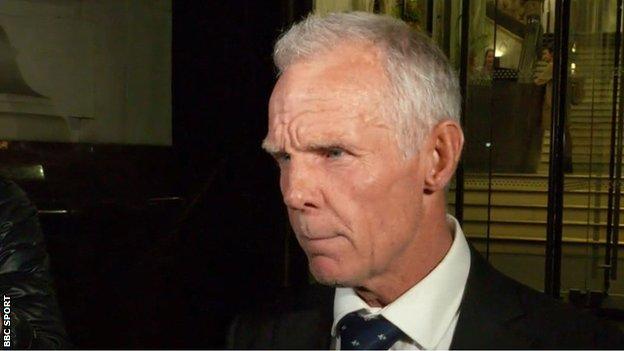
British Cycling’s former technical director Shane Sutton blamed his “downfall” at the organisation on Dr Richard Freeman, a tribunal has been told.
The medic claims he complained to senior management about Sutton’s “misuse of resources”, including an allegation the coach spent £6,000 of the organisation’s money on cosmetic dentistry.
He says he fears that Sutton learned of his actions, doing “further damage” to their relationship, and playing a key role in the controversy that subsequently unfolded.
The revelation is included in three newly released witness statements submitted by Dr Freeman as evidence in his fitness-to-practise hearing.
In them he claims that Sutton told him that he was “finished” after suspecting the medic of being a “whistleblower” over “misappropriation of resources”.
In claims that will also add to the intrigue surrounding the practices of the highly successful British Cycling and Team Sky (now Ineos), Freeman also says the unregulated availability of prescription-only medicines was “considered a marginal gain by management”.
He claims he was asked by his then-boss ex-medical director Dr Steve Peters to treat a host of senior management and staff as well as riders, and to give them medication free of charge.
Dr Freeman has been accused by the General Medical Council (GMC) of ordering banned testosterone to the National Cycling Centre in 2011 “knowing or believing” it was intended to boost an athlete’s performance.
He has admitted 18 of 22 charges against him, which include initially lying to try to cover up the order and to a UK Anti-Doping (Ukad) investigation.
But Dr Freeman denies the key accusation, saying he was bullied into ordering the drug by Sutton to treat his erectile dysfunction.
Sutton has denied those claims, insisting the doctor is lying.
Freeman says he “complained to the board of what I believed was misuse of British Cycling resources by Mr Sutton, including £6,000 for his personal cosmetic dentistry performed by the official British Cycling dentist, funding for a three-year physiotherapy degree for a masseuse and scans for staff and their families”.
“These attempts at whistleblowing were highly likely to have been reported to Mr Sutton, and as a result would have caused further damage to our relationship,” he says.
Freeman also claims that “the most serious breakdown in the relationship” came in early 2016 when Sutton believed the doctor had complained to UK Sport about his alleged “misappropriation of resources”.
“The whistleblower’s email to UK Sport was referred back to the Chief Executive and deemed to be a grievance.
Freeman says Sutton demanded that he confess to being the source, and that he was “shocked at his outburst and threats made during that intimidating exchange”.
“I refused and he said that was it, ‘you’re finished’.”
On Saturday, Sutton told the Telegraph that Dr Freeman had “got himself into something deep here and had seen me as a way out”.
Sutton resigned from British Cycling in April 2016 having been suspended amid an investigation into discrimination allegations. He was eventually cleared of eight of the nine allegations.
Dr Freeman also says in the witness statements that he suspected that Sutton was the source of a newspaper story about a mystery medical package delivered to the doctor and administered to Sir Bradley Wiggins at a race in France in 2011.
The controversy later became the subject of a Ukad investigation.
“In September 2016 I received several phone calls from him, in an agitated state, blaming me for his downfall,” writes Freeman in his witness statement.
“In the last call he told me he had spoken to a journalist who was going to run a story regarding an illegal injection… and that we were all finished.
“He said this related to myself, [team boss] Sir Dave Brailsford and Sir Bradley Wiggins. I was devastated.”
Freeman, Brailsford and Wiggins have all always denied wrongdoing over the incident.
Freeman says that when the story broke the following month “it came as no surprise that the allegation was made about me and I assumed that Shane Sutton was the source”.
Sutton has denied knowing what was in the jiffy-bag, and has said that he always supported Freeman through his many personal problems during his time at British Cycling.
Freeman also says he was asked to treat a host of senior management and selected staff at British Cycling and Team Sky by Dr Peters, one of the top names in sports medicine, “and to dispense medication (free of charge) out of British Cycling supplies, which I did without thinking it through…”
He says he gave one member of the medical team steroid pellets, and treated the wife of a rider for severe hypertension, prescribing her medication “to control blood pressure”.
Freeman has admitted he “inappropriately provided medical treatment that did not constitute first aid” to non-athlete members of staff”, and “failed to inform three patients’ GPs of medication prescribed and reasons for prescribing”.
“I did not feel able to refuse the request for help,” he says in his witness statement.
“I now accept… that treatment of staff, family and friends should be limited to emergency situations only.”
Freeman says that when he joined British Cycling he “picked up the process that was already in place and fell into errors because of the convenience to the patients, and was considered a marginal gain by management”.
Freeman adds that Dr Peters “encouraged autonomy which led to professional isolation”.
He says: “At London 2012 he instructed use of our equipment and use our own clinical facilities in our accommodation block, instead of using those provided by the British Olympic Association [BOA].
“This institutionalised attitude continued through to Rio 2106 and did not foster good relationships between BC [British Cycling] and the sports medicine establishments of the BOA and EIS [English Institute of Sport].”
The hearing continues.